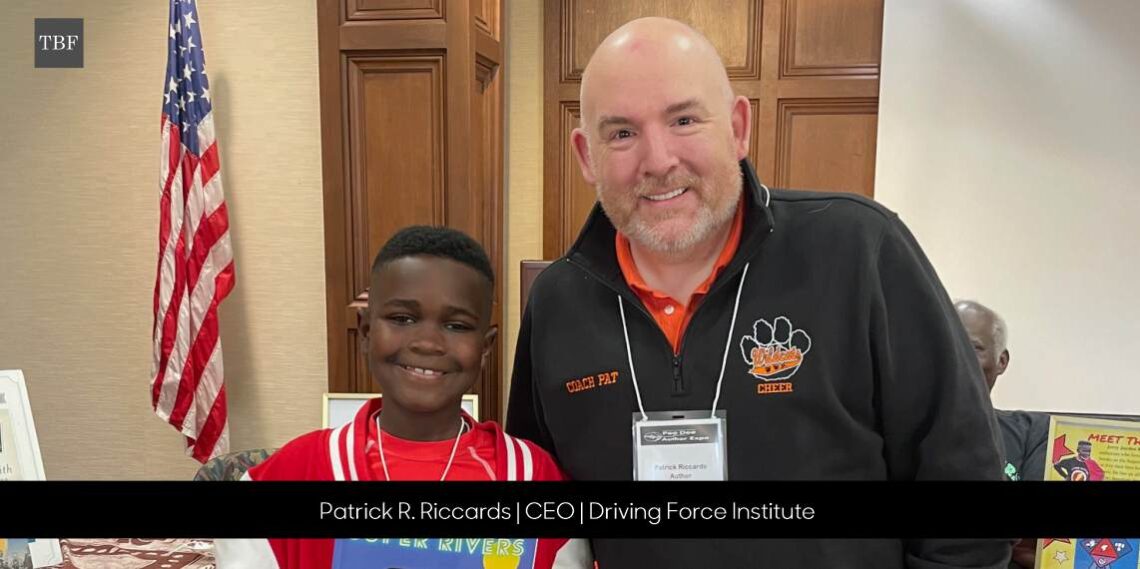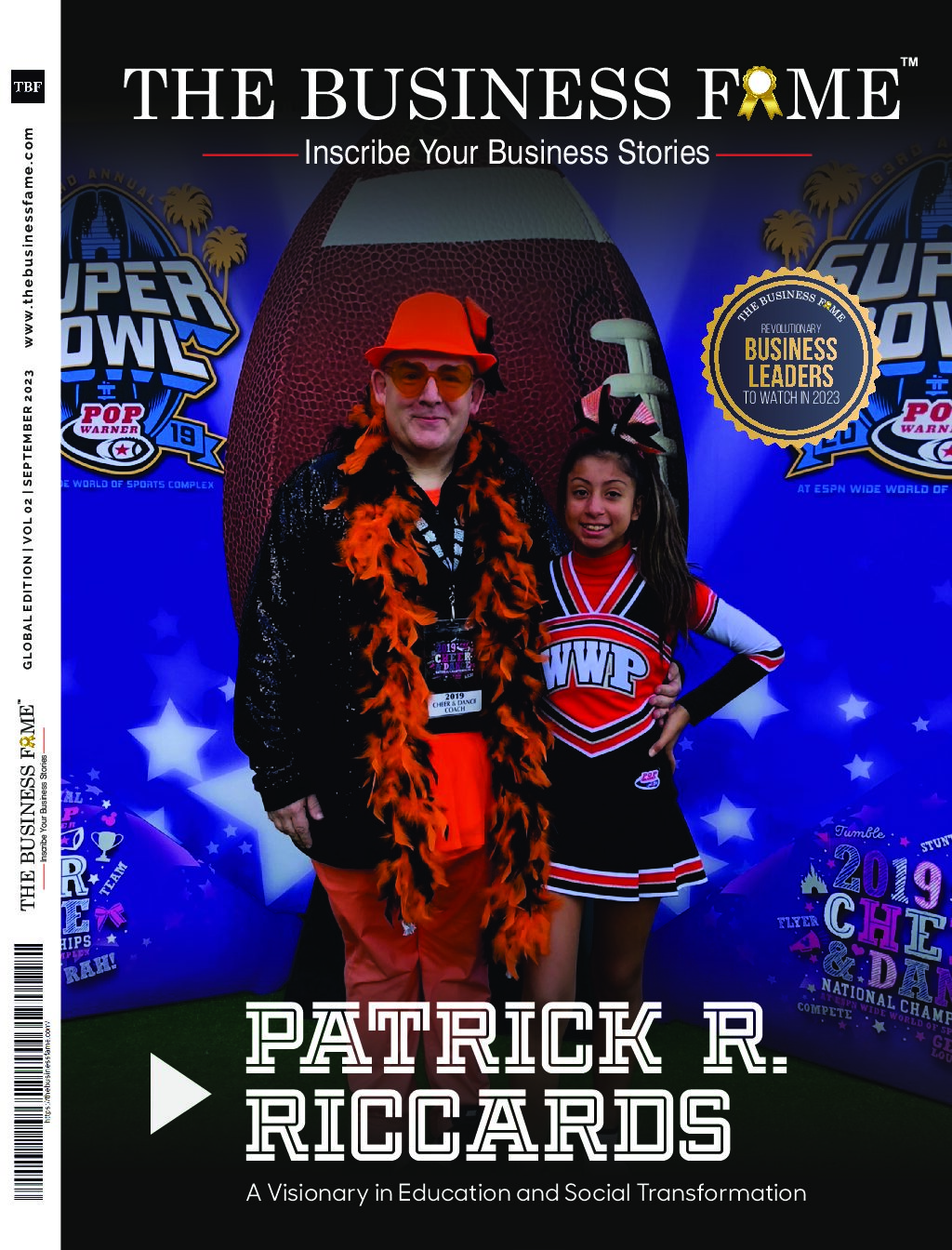Patrick Riccards is a luminary whose work spans the realms of education, civics, and social change. He is the founder of the Driving Force Institute for Public Engagement (DFI), a nationwide initiative on a mission to revolutionize the teaching and learning of American history and civics. DFI accomplishes this by creating thought-provoking, relevant video content for students, coupled with professional development opportunities for teachers. At the core of DFI’s mission is the belief in inspiring today’s learners to “think like historians.”
In addition to his role at DFI, Patrick serves as the executive director and CEO of Life After Hate, a pioneering organization at the forefront of the violence intervention community. This role underscores Patrick’s commitment to fostering social transformation and addressing the complex issues surrounding violence and extremism.
Previously, Patrick held the position of a university vice president and served as the chief communications and strategy officer at the Woodrow Wilson National Fellowship Foundation. During his tenure, he played a pivotal role in the development of several flagship initiatives, including the High Meadows Graduate School of Teaching and Learning, which was later acquired by the University of Kansas in 2022.
A Lifelong Commitment to Learning and Leadership
Patrick’s educational journey is a testament to his commitment to continuous learning and personal growth. He earned his undergraduate degree from the prestigious University of Virginia, known for its rigorous academic programs.
Furthermore, he furthered his knowledge and expertise in nonprofit leadership by completing the Non-Profit Leaders Executive Education Program at Stanford University’s Graduate School of Business, a renowned institution for business education.
Patrick’s dedication to education is ongoing, as he currently pursues a doctoral degree at the University of Southern California’s Rossier School of Education. This academic pursuit reflects his passion for advancing the field of education and his desire to contribute to its improvement through research and scholarship.
Patrick resides in Florence, South Carolina, alongside his wife, Jennifer, and their children, Michael and Anna. In addition to his professional and academic endeavors, he has volunteered his time and expertise as a coach for his daughter’s competitive cheer team from 2017 to 2021. This role allowed him to help lead a group of 19 tween girls to Nationals, achieving a remarkable top 10 finish in December 2019. They also earned the title of runners-up at the 2019 YCADA Globals competition. Patrick’s dedication to coaching demonstrates his commitment to mentoring and inspiring young talents beyond his professional roles.
The Birth of the Driving Force Institute
The inception of the Driving Force Institute was, in fact, sparked by rejection. Patrick was in the midst of incubating a history learning initiative at a previous job when the employer decided to discontinue the initiative, resulting in the termination of his position. However, he held fast to the belief in the possibilities and took to heart the advice imparted by a mentor who frequently reminded him that “if you can dream it, you can do it.”
Patrick was determined to make American history both interesting and relevant to today’s learners. He recognized the need to deliver content in a manner that resonated with the preferences of contemporary learners, who no longer favored outdated, dusty textbooks from previous generations. They sought engaging and intriguing content. Despite the initial rejection, Patrick and his team persevered, diligently crafting content that captivated both educators and students alike.
The early stages of this endeavor were marked by frequent failures, but they embraced a “fail fast” approach and seized every setback as an opportunity to learn and improve. Today, DFI has achieved remarkable success, reaching over 53 million users. The institute has forged partnerships with prestigious organizations like the Smithsonian, New York Historical Society, American Battlefield Trust, White House Historical Association, and many others. Collaborating with state departments of education to develop content tailored to their specific needs, Patrick and the DFI team have proven that American history can indeed be made interesting and relevant to all. Their journey demonstrates that there is a bright future for those willing to take risks, learn from failure, and ultimately achieve success.
Unique Approach to History Education Through Video Technology
DFI is not the first company to utilize video technology to enhance instruction, but it approaches this technology in unique ways. It provides bite-sized portions of learning that serve as catalysts for class discussions, sources of inspiration for questions, or triggers for well-informed debates. DFI recognizes that history doesn’t have to be solely conveyed through traditional textbooks. To demonstrate the relevance of American history, the delivery method must be as engaging as the content itself. Therefore, DFI leverages technology to meet learners where they are and deliver information in ways that suit their preferences.
Teaching American history has become increasingly complex and contentious in recent times. Some educators opt for a more selective approach, focusing on events and dates that are less likely to generate controversy or provoke the ire of parents or school board members. DFI, however, takes a contrasting stance. It embraces the messiness of history, fearlessly delving into stories that may be deemed too controversial or polarizing for the classroom. DFI tackles narratives that are embraced by one segment of the population while facing condemnation from another. The company believes in presenting the complete history, viewing it as both an obligation and a response to the desires of today’s learners.
DFI does not attempt to whitewash history; instead, it presents history in its full technicolor, acknowledging all its flaws and shortcomings. This approach is aimed at making the nation’s history as meaningful and comprehensive as possible for its audience.
Learning from Experiences
Patrick understands that our life experiences, both positive and negative, shape who we become. His leadership journey, particularly in spearheading a nationwide effort to enhance literacy instruction, has taught him the paramount importance of comprehending his audience and addressing their needs effectively. In his involvement with the creation of two unconventional higher education institutions, Patrick has honed the ability to disregard skeptics and go to great lengths to prove them wrong. He has learned how to transform setbacks into valuable lessons, using these experiences to refine his own professional guiding principles.
Through the years, Patrick has leveraged his accumulated experiences to evolve as a leader. He has achieved a level of success far surpassing his past accomplishments, thanks to a combination of both triumphs and failures. Patrick now recognizes that success is predicated on having well-defined objectives and metrics, collaborating with exceptional teams, empowering others to excel in their areas of expertise, and maintaining a continuous process of measurement, adaptation, and improvement. These principles have become his professional North Star, guiding his path toward continued success.
A Commitment to Education and Nonprofit Leadership
Patrick’s illustrious career encompasses a diverse array of roles and accomplishments. He has held the position of CEO at the Connecticut Coalition for Achievement Now and served as the Executive Director for Communications and Public Affairs at the American Institutes for Research. Additionally, Patrick has played a pivotal role as the Chief of Staff to the National Reading Panel and as the Executive Director of the Pennsylvania STEM Initiative. He initiated his career working on Capitol Hill and engaging in political campaigns.
Currently, Patrick is actively involved in several board and advisory positions, demonstrating his commitment to education and nonprofit initiatives. He serves on the Board of Directors for the Center for the Collaborative Classroom and Project Tomorrow, and is a member of the advisory board for the Education Writers Association. Patrick also contributes his expertise as a member of the Forbes Nonprofit Council, where he regularly shares insights on nonprofit strategy and leadership.
Furthermore, Patrick is a renowned award-winning author, known for his thought-provoking works. He writes and shares his insights on education under the pseudonym “Eduflack.” His notable books include “Dadprovement,” which chronicles his personal journey of building a family through adoption, and “Why Kids Can’t Read: Continuing to Challenge the Status Quo in Education,” where he served as the editor and contributing author. Additionally, he has recently released “Dad in a Cheer Bow.”
Patrick is a sought-after speaker, addressing topics at the intersection of policy, research, and engagement. He has authored or ghost-authored content that has been featured in numerous prominent publications, including USA Today, Washington Post, New York Times, and Education Week. His multifaceted career and contributions reflect a deep dedication to advancing education and nonprofit endeavors.
Transforming Young Athletes and Learning Life Lessons
For a span of four years, Patrick took on the role of coaching my daughter’s competitive cheerleading squad. His dedication was unwavering as he worked with a group of 19 tween and teen girls, helping them not only become physically stronger athletes but also fostering their growth as fierce competitors and empowered young women. This journey was marked by its toughness, fatigue, numerous challenges, moments that brought tears, and, at times, heart-wrenching setbacks.
However, the ultimate outcome was profoundly rewarding. Patrick played a pivotal role in helping these girls realize their dreams. They not only successfully earned a spot at the Nationals but also achieved a remarkable Top 10 placement. Furthermore, they went on to secure a remarkable second place at the Globals competition. Patrick poured his heart and soul into coaching, driven by a determination to never let down his daughter and her team.
In return for his relentless efforts, these young athletes imparted invaluable life lessons to Patrick. They taught him about the essence of perseverance, the value of hard work, and the depths of human determination. Patrick’s coaching experience became a two-way journey of growth, where he learned more about life, resilience, and dedication than he could have ever imagined.
Path to Comprehensive Education
Over the course of the past three years, DFI has produced with partner Makematic an impressive catalog of over 500 American history education films, reaching a staggering 53 million users. Looking ahead, the team is gearing up for the United States’ upcoming 250th birthday celebration. They recognize that we are in a nation where too few individuals possess a comprehensive understanding of the history spanning those 250 years.
In 2021, the Driving Force Institute conducted a national survey that yielded concerning results. It revealed that fewer than four in 10 Americans could successfully pass a multiple-choice test featuring questions from the practice exams for the Citizenship Exam. In fact, less than 40% of respondents could answer 12 out of 20 basic questions correctly. This alarming lack of historical knowledge should be a matter of national concern.
Over the past three years, DFI has demonstrated the power of short films in uncovering and conveying untold yet pivotal stories in American history. Looking ahead to the next three years, they are embarking on an exciting new initiative, in collaboration with some exceptional partners. Their aim is to provide learners with a comprehensive video curriculum that delves into the essentials of American history. They believe there is no better way to commemorate our nation’s 250th birthday than by offering learners the invaluable gift of a thorough understanding of what transpired during those two and a half centuries and why it is essential for today’s learners to know, comprehend, and cherish this history.
Advice for Aspiring Entrepreneurs; Dare Mighty Things
Patrick offers valuable advice for aspiring entrepreneurs. He encourages individuals to approach each professional opportunity not just for its current state, but for its potential to serve as a canvas for realizing their dreams. Learning from other industries and drawing lessons from past failures are crucial steps in this journey.
Patrick underscores the significance of using rejection as a source of inspiration and motivation rather than discouragement. He emphasizes that thinking is only the initial step on the path to taking action, improving, and ultimately achieving success.
He draws inspiration from Teddy Roosevelt’s famous words, “dare mighty things,” highlighting that this sentiment encapsulates the essence of the work, especially in the realm of social entrepreneurship. It’s about being bold, taking calculated risks, and striving to make a significant and positive impact on society.
Embracing Failure as the Gateway to Innovation
Patrick firmly believes that embracing failure is the linchpin of innovation. Innovation revolves around the notions of change and improvement, and these goals are not achieved by adhering to the safe and familiar. True progress is made by taking risks, by experimenting, and by acknowledging that failures are inevitable—and, crucially, by learning from those failures.
He emphasizes that when individuals allow themselves the freedom to explore uncharted territories, to test new ideas, and to surround themselves with individuals who are more knowledgeable and passionate than they are, the realm of possibilities becomes boundless.
According to Patrick, the presence of a fear of failure signifies that one is not pushing hard enough, not trying with enough dedication, and not truly engaging in the process of innovation. Instead, he advocates for a culture where failures are not feared but rather embraced as part of the learning process. In this environment, failures are seen as opportunities to grow and move forward quickly, propelling the journey of innovation while constantly gleaning valuable lessons from each mistake and setback along the way.










